she/her // lesbian // old mcr blog @daysfadeandnightsgrow // art by chemicalwhore.jpeg
Don't wanna be here? Send us removal request.
Text
“they tried to kill each other” yes and? do you have a problem with true love
149K notes
·
View notes
Text
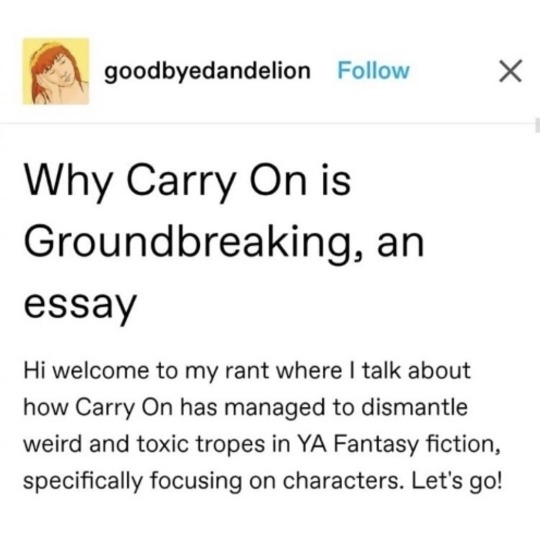
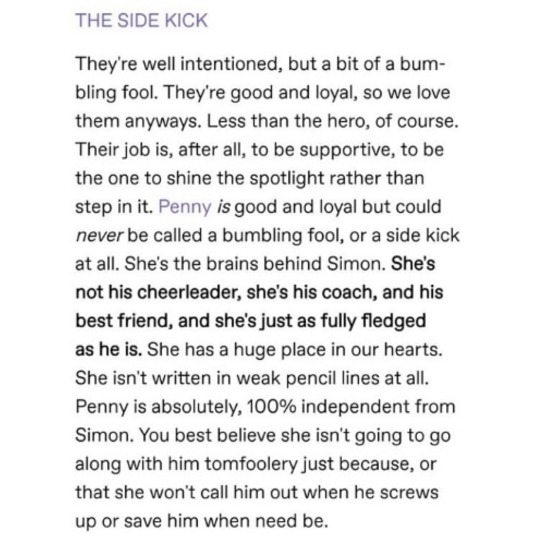
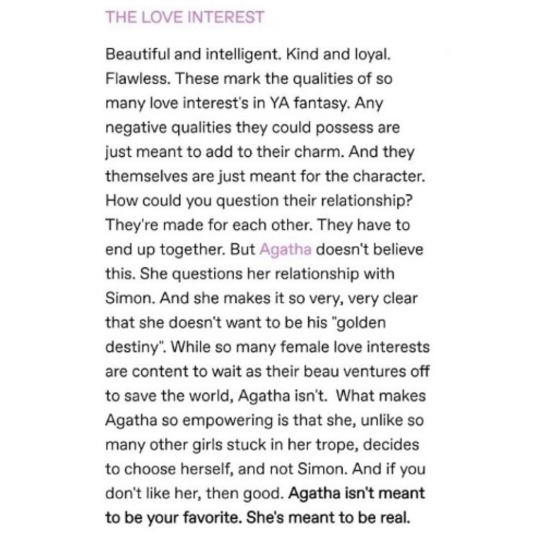
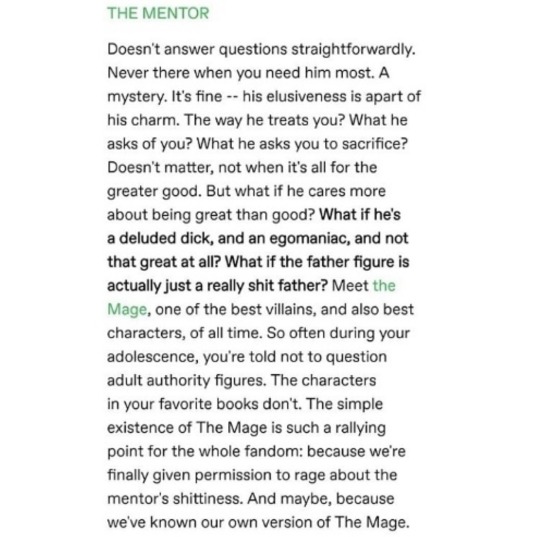
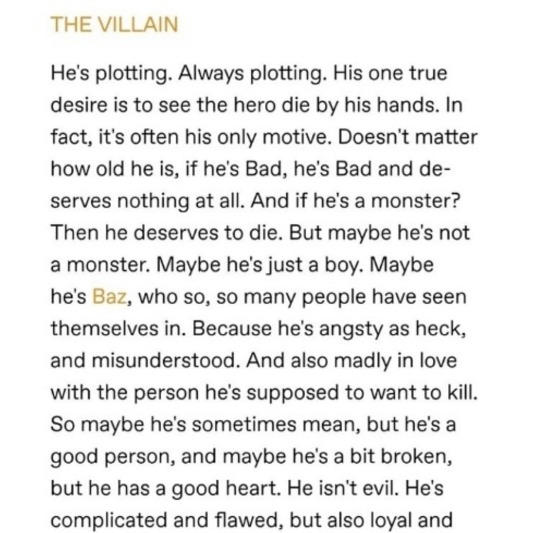
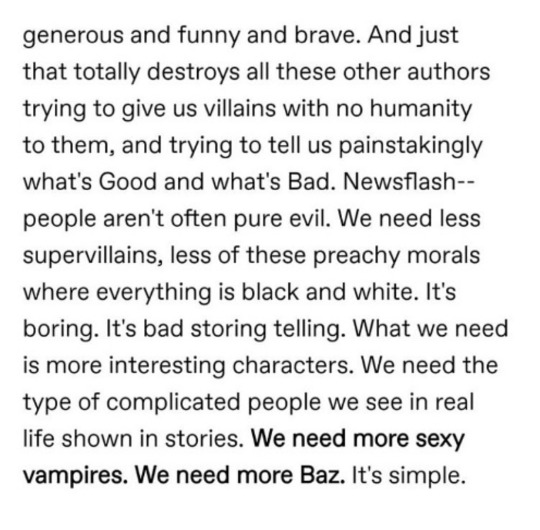
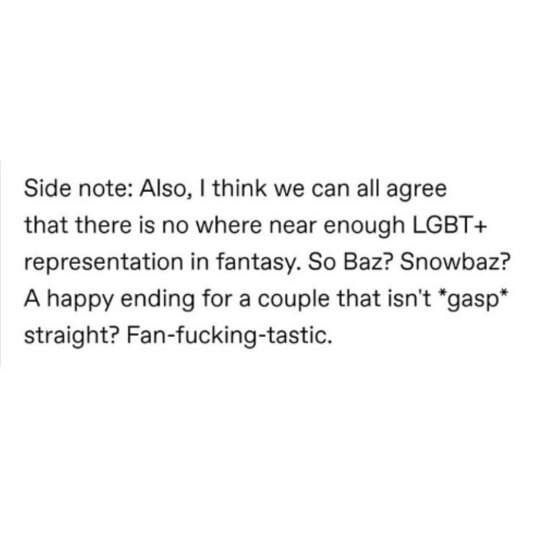
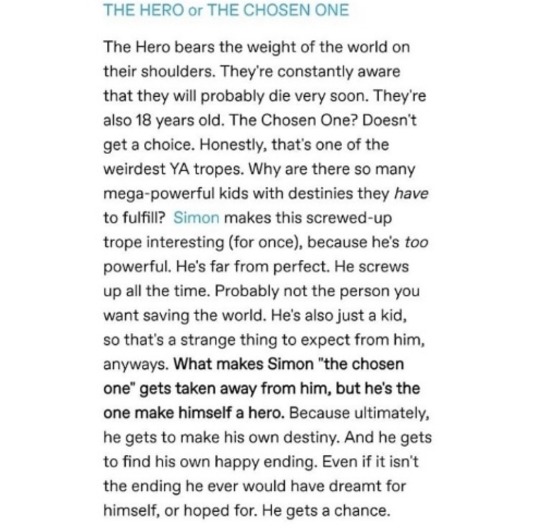

This excellent essay was posted by @goodbyedandelion and reposted on Instagram—however their account sadly seems gone now. But it is in rememberence of their Tumblr spirit that I post a continuation to their essay!
EVEN MORE Reasons Why Carry On is so groundbreaking as a YA Fantasy/Romance
Misconceptions/Character Complexity
A large topic in YA Contemporary is gossip, but I feel like fantasy doesn’t touch on this as much. Think of how others perceive one another in Carry On. Early on we learn that Simon, for example, saw Penny as different because of her race. But of course, we quickly know this isn’t true.
But what about Agatha? In Harry Potter, for example, Lavender Brown and other feminine characters are often looked down upon because of their femininity. We often as a culture perceive beauty as overcompensation for what’s inside. Sometimes Agatha is looked at in the same light in Carry On, but when we see things from her POV, we realize that Agatha is perhaps the smartest one there. Maybe she’s not Penny Bunce-smart, but she has the survival instincts that Penny lacks.
Agatha isn’t the only one. Baz looks cold and unfeeling from others’ POVs, but we quickly learn that he is a boy with a soft heart that’s been hardened by his past. Everyone thinks he cares about nothing but we know he cares about his mother and how she’d feel about him; his father and step-mother and siblings; Simon, of course; Bunce, in his own way; he even cares about flowered suits and dramatic entrances! We think Bunce is nerdy and perhaps annoying, but we learn she’s very sweet and like a mother to Simon. And the mage. Ugh, the mage. We think he cares about Simon but we learn that for every bit he cares about Simon, he cares about the war more.
Rowell doesn’t allow any character to be simple, stereotypical, or as they appear. My sister, for example, was saying that Baz sounded like a stereotypical gay man in the media. But he’s not, is he? He might love fashion but Rowell does not make him simple or stereotypical. Everyone is so complex, and she uses the multi-POV to not just show us their complexity but also the complexity of how they are viewed by others.
Woman on Woman Drama/Anger
For years and years, only one woman was allowed to have a true seat at the table in films. Take Indiana Jones, the original Avengers, and Star Wars for example. This woman was often made to be the sex appeal or romantic interest, but I’ll save that for another day. Because of there only being one spot, it set a precedent that women in media needed to fight with each other to take that spot, thus depriving us of women getting along!
At first, I was worried Rowell had fallen into this trap. Bunce thinks Agatha is simple and too feminine, Agatha thinks Bunce is a major pain in the ass. Their dislike for one another is complicated in that they’re essentially two different types of feminism battling it out, and half of their fight was about Simon and their roles in his life.
But in the end, Penny and Agatha create a relationship that exists outside of their relationship with Simon. Penny sees Agatha’s strength and resilience; Agatha recognizes Penny’s harsh exterior for what is is. When Agatha moves away, they text without his even knowing. Penny is the one that decides they need to check on and save her. In the end, penny and Agatha fight alongside one another.
Rowell didn’t just give us a feminine friendship—she showed us what we’ve been doing, and how to get from Point A to point B. I think it’s the most underrated part of the series.
True Friendship
It might sound bad, but I truly believe a lot of today’s media ruins the idea of friendship. I just feel like none of the portrayals are realistic. Friends are either joined at the hip and have never fought (toxic) or never get along (also toxic). The fact that Baz and Penny and Simon and Penny and Agatha and Penny can get into fights but still continue to love one another platonically is really heartwarming to me.
Trauma/Mental Illness
I remember getting to the end of Harry Potter and thinking “he went through all of that and we’re just supposed to leave him now?” We see some remnants in the most cursed play ever: The Cursed Child. But more than trauma we see someone who looks back on the days they risked their life everyday with *longing.* While that’s about the most Harry Potter thing Harry Potter has ever done (and the most canonical part of that play) it’s so unrealistic. You’re telling me Harry grew up with nothing and was an amazing father—minus a few spats with his son. You’re telling me Harry was able to hold it together emotionally after fighting for his life from ages 11-18 without a therapists help? You’re telling me Harry lost two father figures in the ministry of magic AND spent 7 years going through what amounted to a lesson titled “the government is corrupt” just to be a part of that government!?
Wayward son isn’t like that. Wayward Son shows us what happened to Simon afterwards, and it’s not peaches and cream. He had therapy, he quit therapy. A lot of us have been Simon on that couch, and we all needed the Baz in our life to drag us across a metaphorical America. Wayward Son is hands-down my favorite book. Realistic depictions of mental illness, check. Subverting our expectations of after the end, check. Reading it feels like taking a road trip, check.
As OP mentioned, Simon is a beloved chosen one because he’s just so wrong for the role. He’s not levelheaded where he should be, he’s bold in all the wrong places, he couldn’t possibly maintain a professional relationship with the coven. Meanwhile his super-hot enemy Baz was the absolute perfect choice to be chosen, but he was completely passed over. And part of this chalks up to how Simon became so powerful—fate isn’t twisting its whims this way and that. Simon is only chosen because he was a Petri dish experiment-gone-wrong baby. When Simon asks the fates why, really he should be asking the mage. There’s something delightful about the fact that Simon was made. The chosen one was made, and in the same process, so was the greatest threat.
De-escalation
I think it’s clear by now that Carry On is a great book, Simon Snow is an amazing series, and Rainbow Rowell sure can write. But I feel the need to point out that the end of Carry On wasn’t well-received by everyone. I recommend the series to everyone I know and some people are really disappointed you don’t get a big magical battle at the end. Some people think Simon filling in the humdrum was a cop out. But I disagree. I felt it was thrilling to witness a book where war was as stupid in fantasy land as it can be in real life. This is the first fantasy I’ve ever read where they find a better way to handle conflict than senseless fighting. It’s emotionally rewarding, to me, to see de-escalation. To see conflicts fixed before they start to be huge problems. It was a risky choice for an end, you have to admit. But Rowell pulls it off amazingly.
Nothing is Wrapped in a Bow
A day will never go by without me thinking about the fact that Simon Snow Salisbury doesn’t know who his parents are. Or how Baz will never know what exactly happened with his mother—whether she really ended herself to avoid vampirism and whether she would’ve done it to her too. We’ll never even quite understand the mage’s plan behind fix the humdrum and get an all powerful boy wizard on his side. Rowell doesn’t wrap everything up. She gives you closure as often as she gives you something to ponder. The ending of Harry Potter was so controversial, I think, because it spelled out so clearly much of what was happening. And what you didn’t learn in that epilogue, Rowling released later through Pottermore and interviews. That’s fine and dandy—but there’s something to be said for ending Simon Snow’s books with questions. Not infuriating questions but rather things that I’ll always ponder—that will shed new light on different situations depending on how I look at them. Rowell sets a precedent that you can fill in Simon’s world with your imagination while also reminding us that life doesn’t have endings. Not really, the way books to. Rowell is one of the few writers of today’s fantasy, I’d argue, who’s okay letting things go unanswered. There’s always a thread of fantasy and magic going. It’s something that will keep Simon alive in my heart for many, many years to come.
So yeah, that’s what I think about when I think about Simon Snow. It’s not nearly as coherent as the original post but I hope you enjoy it.
615 notes
·
View notes
Text
I’m sorry but the poetry of Agatha not wanting to return to Watford because it’s a place she associates with being used and abducted (and unsafe) but then making it her home by herding the goats that literally protect the school??? Amazing show stopping beautiful never been done before
831 notes
·
View notes
Text
why is everything so hard but not actually that hard just i cant do it
317K notes
·
View notes
Text
All I want for Christmas is:
dark grey eye shadow
fingerless gloves
a fluffy oversized grey sweater
646K notes
·
View notes
Text
oh to be a scooby doo villain and commit crimes and cause problems on purpose in a halloween costume
7K notes
·
View notes
Text
did u have a hunger games, tfios, divergent and maze runner phase in 2015 or are u mentally stable
20K notes
·
View notes
Text
kinda weird that u can think about someone as much as u want and they have no idea
1M notes
·
View notes
Text
wow i need a drink [pours apple juice into shot glass]
525K notes
·
View notes
Text







Debbie Harry ~ Blondie ~ 1978
4K notes
·
View notes
Text
do u ever send smth in a chat thats not even risqué like “i luv salsa” but no one responds so u start overthinking it like…. maybe one of their parents died making salsa…… maybe they were all just talking abt how they hate salsa……. maybe salsa isnt evn real and they have no idea what im talking abt
486K notes
·
View notes
Text




Merle Oberon as George Sand in A Song to Remember, 1945
5K notes
·
View notes
Text
yes I know everyone talks abt having a main character complex.. but what abt those of us with a definite side character complex?? like I KNOW in my heart that I'm totally the staple friend who offers emotional support/mild comedic relief and probably has a little side arc of self development? like idk man.. yeah I'm literally the friend who cheers the main character up and has to learn to stress less abt work and life and take risks or some shit
4 notes
·
View notes





